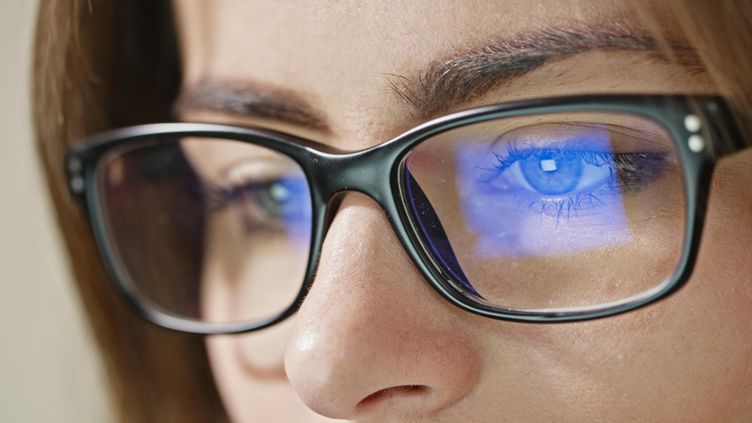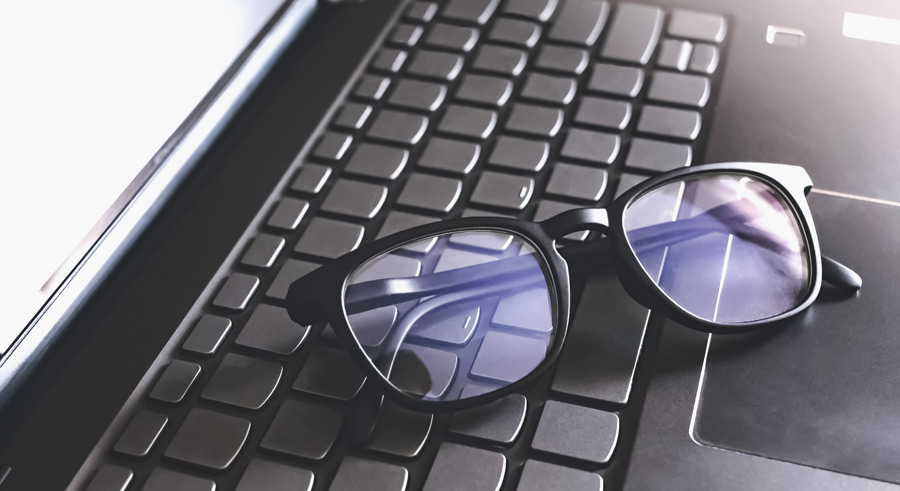Everything you need to know about blue light glasses
What Are Blue Light Glasses?

If you haven’t heard of blue light glasses, the premise is straightforward. Blue light glasses have lenses that have been treated to limit exposure to blue light wavelengths.
Blue light is naturally occurring and is also manufactured. In its natural setting, the blue light range is located on the light spectrum just before harmful UV rays. When we can see that the sky is blue, we detect blue light radiation with the naked eye.
We often experience manufactured blue light when we look at a screen, such as your TV, tablet, or smartphone. Some LED lighting is a source of blue light radiation. Also, bright white and cool fluorescent tube bulbs and incandescent bulbs emit high-frequency UV radiation, making them the worst way to expose yourself to blue light.
The problem isn’t that all blue light is terrible. In fact, several studies had indicated that blue light could be a mood booster, warding off depression, anxiety, and a slew of other emotional and mental health challenges.
The problem is the length of exposure. Six in ten adults report digital eye strain symptoms, such as headaches, blurry vision, and eye strain, after only two hours of using devices. In addition, the average adult American devotes 10 hours per day on screens and under blue light-emitting bulbs.
Spending some time outdoors, getting a little sun, and blue light exposure isn’t the problem. Prolonged exposure to blue light because of the added time spent on screens and living under artificial light causes harmful eye strain and interruptions to our sleep patterns. Over time, the effects can be detrimental, leading to significant mental health distress because of poor sleep, headaches, as well as visual impairment, and macular degeneration symptoms.
Blue light filtering lenses can reduce the risk of overexposure for anyone who spends two or more hours on screens or other manufactured blue light radiation sources. This is particularly true of anyone who stares at screens after dark because that is when disruption to overall sleep patterns occurs.
Even those who don’t need prescription glasses can benefit from blue glasses. In particular, you can prevent or improve computer vision syndrome symptoms, also called digital eye strain.
Do You Need Blue Light Blocking Glasses?

There are very few reasons not to wear blue light glasses. The benefits are far-reaching, and they carry no risk to your personal health. Even though people typically report experiencing symptoms of blue light overexposure after two hours of screen time, this doesn’t account for the time throughout the day. You may also be exposed to blue light in the form of fluorescent lighting or LED lights. It also makes sense to wear blue light glasses anytime you will be under harmful bulbs or in front of screens to avoid causing the eye strain that causes symptoms. Using blue light glasses as a preventative measure is the point of these lenses.
While blue light glasses should be worn anytime someone will be staring at screens or spending time under harmful lighting, blue light lenses are also particularly helpful when worn at least four hours before bed and after dark. This timing for blue light glasses is meant to minimize disruptions to sleep patterns, one of the most common and more detrimental problems associated with overexposure to blue light.
Another important factor is the strength and type of blue light filtering lens you choose. Some blue light blockers filter only enough blue light to be minimally effective against blue light emitted from screens. This may help those who spend a great deal of their time on computers but need to be able to see the blue spectrum, such as graphic designers who work with colors but want some level of protection. However, these lenses are useless after dark because they offer so little protection from sleep disruption during crucial nighttime hours.
Other lenses block most blue light, around 60%, making them more useful to people who don’t need to see the full-color spectrum and want enough protection to ward off most symptoms and damage of blue light overexposure.
Finally, there are glasses available that completely block all blue light radiation. These glasses significantly affect color balance because blue will look black, and other colors will be affected. These affect your visual perception of the color spectrum while wearing the glasses, but they also offer the most protection. These blue light blockers are most helpful during long hours of exposure, and after dark, blocking blue light, radiation is most important.
While the potential benefits warrant wearing blue light glasses, particularly at the right time, a few might not wear blue light glasses correctly, which can cause harm.
In all the hype about blocking blue light, it’s almost become a collective decision to vilify blue light unnecessarily. Many people are wearing blue light blocking glasses all the time. Unfortunately, while wearing blue light blockers often can be helpful, avoiding blue light altogether can also have detrimental effects to your mental and emotional health.
Too much blue light exposure increases can negatively affect mood. However, not getting regular exposure to the proper amount of light, including blue light, can also create mood disorders, depression, and anxiety.
Always wearing blue light blockers while under bulbs and on screens is a must. Adding blue light filtering lenses to sunglasses for outdoor use can also be helpful. However, it’s important to wear blue light blocking glasses with a lower level filter, say 30% when outside, to ensure you absorb enough blue light to avoid negative effects, including mood disorders. Properly block blue light with lenses that filter 60% or more. Using these lenses while looking at screens and at night will ensure the best possible results.
It’s also important to realize that red and orange are important. Some choose to wear blue light blockers that also block orange and red colors. However, wearing blockers like this during the day can impair your eyes' ability to correctly use your rod and cone system. Continued lack of red and orange can damage the eye’s biological ecosystem, leading to several eye-related diseases.
How Much Will It Cost To Add Blue Light Coating To Glasses

A few factors will determine the price of your blue light blocking glasses. The frames you choose, for example, will change the total cost of your purchase. Whether you choose a brand name or other lens features, and whether you have a prescription will affect your price tag as well.
Specifically related to the blue light lenses' price, the filter power will play a significant role. Blue light blocking lenses that block 90% or more of blue light will come at a higher price by most retailers compared to those that block only 30% of blue light. You may purchase such lenses from us as low as $59.
Amber blockers, those that block some red and orange, are best for those who need to wear glasses at night but want to avoid sleep disruption. They tend to be more expensive lenses that only block the blue spectrum, but it will range up to 50 dollars on the high end.
Many designer companies will charge upward of $95 and more. Be sure to check on the strength, quality, and filter type as well as percentage. There are cases when you will pay for the brand rather than the blue blocking lens finish.
How to Choose the Right Pair of Blocking Blue Light Computer Glasses
The best first step when choosing the right pair of blue light blocking glasses is to consult with your physician. Your ophthalmologist will be able to assess your needs and provide you with all the recommendations you need for your current eyecare.
Your ophthalmologist may or may not recommend blue light blocking lenses. Still, if you choose to purchase this important feature based on your understanding of blue light's crucial role, you’ll want to select a trusted provider.
High-quality, low-cost blue light glasses will have good reviews, an acceptable return policy and most importantly, test results. You’ll be able to maintain your eye health and prevent damage by doing your research. Choosing a great provider is a significant factor when choosing the right pair of blocking blue light computer glasses for you.
